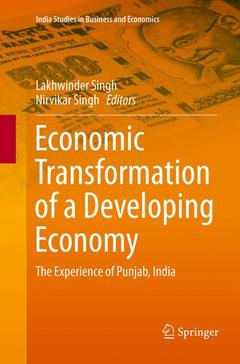Description
Economic Transformation of a Developing Economy, 1st ed. 2016
The Experience of Punjab, India
India Studies in Business and Economics Series
Coordinators: Singh Lakhwinder, Singh Nirvikar
Language: English
Subjects for Economic Transformation of a Developing Economy:
Publication date: 03-2019
470 p. · 15.5x23.5 cm · Paperback
Publication date: 02-2016
Support: Print on demand
Description
/li>Contents
/li>Biography
/li>Comment
/li>
Foreword by Prof. Kaushik Basu
This book traces the development experience of one of India?s most dynamic and prosperous states, Punjab, which has provided the country with a much-needed degree of food security. The relative regression of Punjab?s economy in the post-economic reforms period and slow current economic growth give cause for concern. The contributions in this book address the question of why the structural transformation of Punjab?s economy has fallen into the middle-income trap. Each investigates the policy constraints influencing the relative stagnation of the economy and suggests appropriate measures for alleviating them. By integrating theoretical constructs and new evidence, the authoritative contributions diagnose the nature of the current problems and offer practical solutions. They cover important issues such as the crisis of agrarian transition, agrarian markets and distributive justice, employment growth and transition to non-agriculture sectors, fiscal policy, external factors in economic transformation, and perspectives on rejuvenating the state?s economy.
Lakhwinder Singh is a Professor at the Department of Economics, Centre for Development Economics and Innovation Studies (CDEIS), Punjabi University, India. Prior to this, he has been a faculty at the University of Delhi and National Institute of Public Finance and Policy, New Delhi. He has been a Ford Foundation Post-Doctoral Fellow in Economics at Yale University, USA and a Visiting Research Fellow, Seoul National University, South Korea. He has been awarded Asia Fellowship by the Institute of International Education, New York, 2001. His current research focuses on the national innovation system, international knowledge spillovers, pattern of development, globalization and agrarian distress in developing economies. Apart from publishing a number of research papers in journals of national and international repute, he is also the founding editor of the journal “Millennial Asia: An International Journal of Asian Studies”, published by Sage Publications and Association of Asia Scholars. He has co-edited the books “Economic and Environmental Sustainability of the Asian Region” (Routledge, 2010) and “Technology, Innovations and Economic Development: Essays in Honour of Robert E. Evenson” (Sage Publishers, 2015).
Nirvikar Singh is a Distinguished Professor of Economics and Sarabjit Singh Aurora Chair of Sikh and Punjabi Studies at the University of California, Santa Cruz, where he is also the Director of the Centre for Analytical Finance. He is a member of the Advisory Group to the Finance Minister of India on G-20 matters, and has served as a consultant to the Chief Economic Adviser, Ministry of Finance, Government of India. His current research interests include entrepreneurship, information technology and development, business strategy, political economy, federalism, and economic growth. He has authored over 100 research papers, including several on the East Asian and Indian economy and co-authored or edited four books,th




